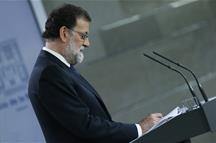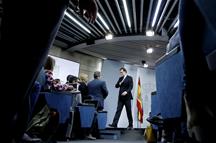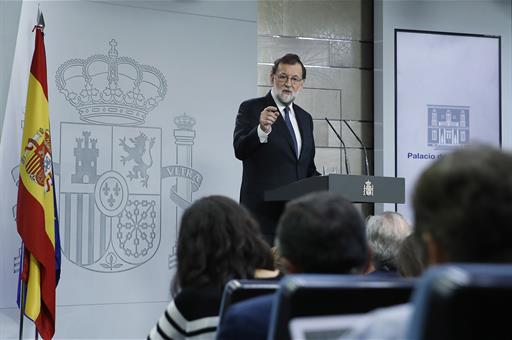Council of Ministers
"Neither the autonomy nor self-governance in Catalonia will be suspended"; but legality will be recovered, says Mariano Rajoy
Council of Ministers - 2017.10.21
Moncloa Palace, Madrid
Mariano Rajoy stressed that the government "has been forced to apply Article 155 of the Constitution", although "we did not want to and it was not our intention". He added that this article, which "is only applied in exceptional circumstances", was necessary because "no democratic country can accept the law being ignored or changed and that this was all done while trying to impose their criteria on others".
As regards the objectives of the decision taken on Saturday by the government, the President of the Government pointed out that they are four-fold: "To return to legality, recover normality and co-existence, continue with the economic recovery and hold elections. Returning to legality means restoring the validity of the Spanish Constitution and the Statute of Autonomy of Catalonia".
Article 155 of the Constitution
Pool Moncloa/ Juan Carlos HidalgoThe President of the Government also listed the measures to be set in motion following the activation of Article 155. Firstly, we will call for the "the President of the Regional Government of Catalonia, the Vice- President of the Regional Government of Catalonia and the councillors that make up the Cabinet of the Regional Government of Catalonia to be removed from office". He added that "the exercise of these functions will correspond to the bodies or authorities that the Government of the Nation creates or appoints to that end. In principle, the idea will be that the ministerial departments will take on this responsibility for as long as this exceptional situation lasts".
He also pointed out that the administration of the Regional Government of Catalonia "will continue operating as an ordinary administrative organisation", although "it will act under the guidelines of the bodies or authorities set up or appointed by the Government of the Nation".
Mariano Rajoy added that the task of dissolving "the Regional Parliament of Catalonia falls to the President of the Government" and that "elections must be held "within a maximum term of six months". However, he clarified that his intention is "to do this as soon as we recover institutional normality".
Recover self-governance
As regards the Regional Parliament of Catalonia, "this will exercise the representative function that it is tasked to carry out", but a series of control measures will be proposed "in order to guarantee that this is done with full respect for the Statute of Autonomy of Catalonia and the Constitution". Among other things, it will not be able to propose any candidate to the Presidency of the Regional Government of Catalonia, nor hold any investiture session or take decisions that go against the constitutional legality.
 Pool Moncloa/Juan Carlos HidalgoAt any event, President of the Government Rajoy clarified that "neither the autonomy nor the self-governance of Catalonia will be suspended; but rather those individuals that have placed this self-governance outside of the law and the Constitution and the Statute of Autonomy will be removed from office". In other words, self-governance will be recovered "to restore the legality and co-existence of all the people of Catalonia, and not just those in favour of independence".
Pool Moncloa/Juan Carlos HidalgoAt any event, President of the Government Rajoy clarified that "neither the autonomy nor the self-governance of Catalonia will be suspended; but rather those individuals that have placed this self-governance outside of the law and the Constitution and the Statute of Autonomy will be removed from office". In other words, self-governance will be recovered "to restore the legality and co-existence of all the people of Catalonia, and not just those in favour of independence".
Impoverishment of Catalonia
The President of the Government expressly mentioned the economic consequences that this process may have for Catalonia because "the latest figures we have seen are alarming". He announced that more than 1,000 companies have already moved their registered offices outside of Catalonia and that, "investments and tourism have both been negatively affected".
In this regard, he called for companies not to leave Catalonia because "we should all remain calm as this will be resolved without causing any further harm to anyone".
Mariano Rajoy also explained what would happen "if Catalonia became independent". Among other things, he added that "it would leave the European Union and the World Trade Organisation", it would lose "all the facilities offered by the European Central Bank", it would suffer a "serious credit crunch" and "inflation would disproportionately spiral with the corresponding effects on consumption and investment". He pointed out that "all of this would lead to a downturn in the economy of Catalonia by around 25% to 30% of GDP".
Background
In his speech, the President of the Government also reflected on how the current situation was reached. He said that this has been "a unilateral process, "contrary to the law", and "seeking out confrontation". Mariano Rajoy added that the most "striking" and "anti-democratic "aspect of the process took place on 6 and 7 September in the Regional Parliament of Catalonia. "In just a few hours, a majority wiped out the Spanish Constitution in Catalonia, the Statute of Autonomy of Catalonia, the Referendum Act was passed as well as the so-called Transience Act - a form of Constitution of Catalonia until a new one was definitively approved" - in the words of its authors.
Mariano Rajoy recalled that, before events could go awry in Catalonia, the government decided to send, on 11 October, a formal demand to the President of the Regional Government of Catalonia in order to clarify "whether they had declared independence or not", a demand that went unanswered. He added that the government could have sent this formal demand earlier, but opted to act "with prudence", "responsibility", and "common sense".
Dialogue
 Pool Moncloa/Juan Carlos HidalgoThe President of the Government also said that the Regional Government of Catalonia did not respond "in time or in form" to the demand and hence it would seem that some people wanted to reach this situation, that is, for Article 155 to be applied".
Pool Moncloa/Juan Carlos HidalgoThe President of the Government also said that the Regional Government of Catalonia did not respond "in time or in form" to the demand and hence it would seem that some people wanted to reach this situation, that is, for Article 155 to be applied".
President of the Government Rajoy stressed that "no-one proposed dialogue on the part of the Regional Government of Catalonia", but rather they sought to "impose it". Furthermore, "dialogue outside of the law and the rulebook is profoundly undemocratic and it is quite clearly not dialogue to impose on the governors - in this case the Government of Spain - to deliberately break the law", he added.
Support from PSOE and Ciudadanos
The President of the Government pointed out that all these measures "have been agreed with the Socialist Party and with Ciudadanos". He said that this support should be interpreted "as support for the law, the rule of law, our Constitution and the values in which we believe and which have made us great".
Before ending his speech, the President of the Government sought to convey "a message of calm" to the people. "I am fully aware that this is a difficult time but that all together we can overcome this as we have overcome very complicated events during the course of our history together which, by the way, has lasted for a good few centuries".
Non official translation





